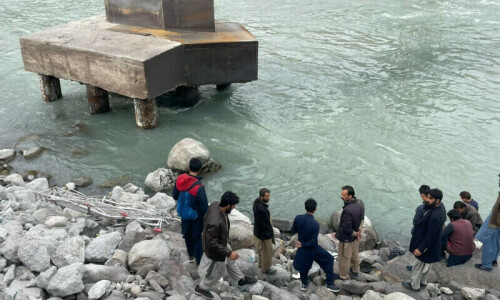JERUSALEM: Israelis and Palestinians came close to striking a peace deal at 2001 talks in Egypt, but gaps remained on the core issues of the conflict, according to a report published on Thursday.
The publication came a day after the two sides revived negotiations for the first time since the talks broke down in the resort of Taba, after formally relaunching the Middle East peace process at a US-hosted conference last month.
The report in the liberal Haaretz daily cites a 26-page document signed by Gilad Sher, the chief of staff to former Israeli premier Ehud Barak. It was drawn up to summarise the state of Israeli and Palestinian positions at the collapse of the talks, widely believed to be the closest the two sides ever came to striking a peace deal.
Among the obstacles:
— Both sides had agreed to the principle of adjusting the June 4, 1967 borders but differed on the details.
Israel wanted to keep six to eight per cent of West Bank territory in order to maintain settlement blocks — which would comprise 80 per cent of settlers in the West Bank — while the Palestinians were willing to exchange up to 2.3 per cent of the territory.
— Both sides insisted on keeping sovereignty over the passage linking the Gaza Strip to the West Bank.
— Both sides agreed that sovereignty over Jerusalem, with two capitals for two states, but differed on the details of continuity of their respective neighbourhoods.
On the issue of the Old City, Israel wanted to set up a “special regime” and keep control over Jewish and Armenian quarters. The Palestinians wanted sovereignty over Muslim, Christian and parts of the Armenian quarters.
The two sides could not agree on the issues of the Al-Haram Al-Sharif/Temple Mount site, most sacred in Judaism and third-most revered in Islam.
Israel suggested that sovereignty would be “ambiguous,” while the Palestinians wanted full control.
- On the question of Palestinian refugees, Israel said it would recognise the suffering of the refugees of 1948, when Israel was created, and to accept between 20,000 and 40,000 refugees based on humanitarian concerns, and to contribute financially to refugee rehabilitation.
The Palestinians demanded that Israel accept sole responsibility for the creation and perpetuation of the refugee problem and to recognise the refugees’ right of return.—AFP











































Dear visitor, the comments section is undergoing an overhaul and will return soon.